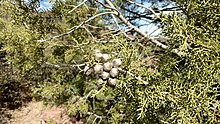|
Hesperocyparis revealiana
Hesperocyparis revealiana is a rare Mexican species of conifer in the cypress family, is endemic to a small area of the State of Baja California in northwestern Mexico.[2][3] The type locality is the Rincón de Santa Catarina, in the Sierra de Juárez of the Peninsular Ranges System.[3] It was previously assumed to be an isolated population of Cuyamaca cypress.[4] DescriptionHesperocyparis revealiana is a tree up to 10 meters (33 feet) tall. It has red scaly bark. Male cones are 3–4 mm long. Female cones are 15–20 mm long.[2][5]  References
External links |
||||||||||||||||||||||||||||||||
